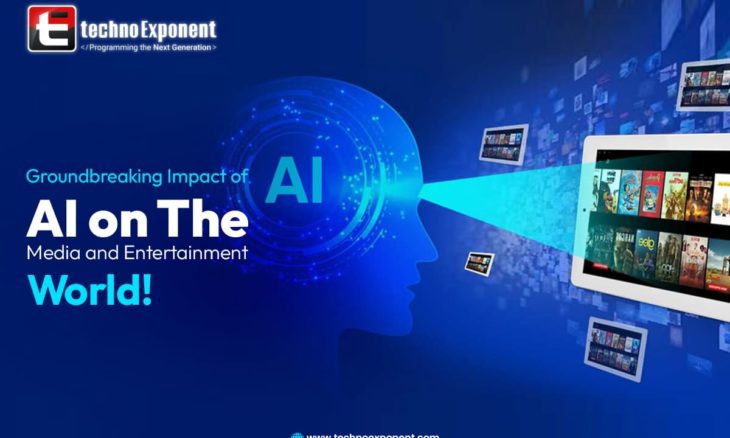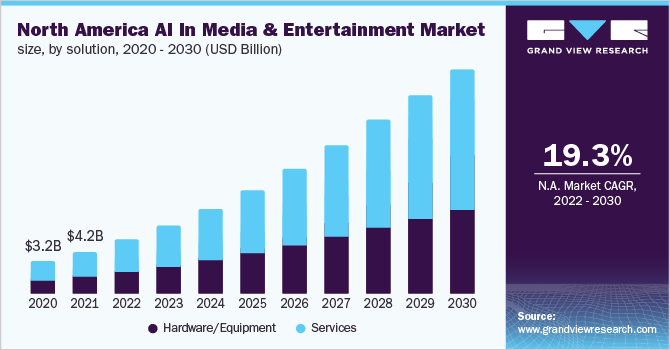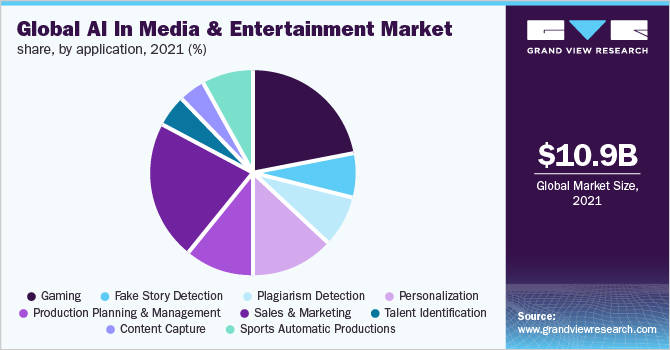
In recent years, standing in this rapidly evolving tech-driven world, we already witnessed a remarkable surge in artificial intelligence (AI) across the globe, profoundly impacting our lives and work. The mesmerizing futuristic technology has spread its wings going beyond the IT sector and getting seamlessly integrated into diversified sectors like software development, education, healthcare, recruitment, e-commerce, cybersecurity, quality assurance, and more. And notably, the media and entertainment industry, too, has not remained untouched by this technological revolution!
As per stats by the end of 2023, the usage of AI in these sectors is predicted to reach $ 8.4 billion. This stat denotes the fact that a considerable number of media and entertainment industries are now relying on AI. Now, of course, a question will lurk in your mind what makes AI so relevant in such dynamic sectors? Dig deeper into the blog and find the answers.
Here’s How AI is Revolutionizing Media
Automated Content Creation
AI has profoundly reshaped how media platforms create and engage with their audiences. One remarkable outcome is the emergence of AI-powered tools that harness techniques like natural language processing (NLP) and text analysis to generate audio, written, and visual content.
This innovation helped the media companies to produce different types of content (website content, news articles, blogs, and online platforms) swiftly, significantly reducing the dependence on manual effort. But at the same time, it’s also true that AI tools fail to match the excellence of human-written content. So, to ensure top-notch content creation, media companies are now focusing on combining these two.
Used for Predictive Analysis
Predictive analysis driven by AI delves into past data to unveil future viral content trends. By using these valuable insights, marketers become able to create compelling online content, pinpointing their target audience with ease. But AI magic doesn’t stop there; it’s a secret weapon for search optimization too. Beyond content, this technology optimizes SEO for maximum visibility and engagement.
AI also showed it’s worth mentioning the impact of chatbots, turbocharging customer service, and virtual assistants, revolutionizing how businesses connect with customers.
Rapidly evolving usage of AI in Media and Entertainment Industry ( in USD Billion )

Growing usage of AI in Media and Entertainment between 2023-2030 in North America
News Anchoring
AI-powered virtual news anchors have emerged as a revolutionary force in journalism, reshaping the media landscape worldwide. In 2018, China’s Xinhua news agency made headlines by unveiling the world’s first AI news anchor, marking a pivotal moment in the industry’s embrace of technology. India, too, has joined this transformative wave with AI news readers like Sana.
These groundbreaking virtual news anchors have the mesmerizing capacity to provide real-time news using synthesized voices and lifelike avatars, offering a unique and engaging news experience. They can operate around the clock, providing uninterrupted news coverage, free from human limitations like fatigue and bias. Their impartiality enhances the credibility of news broadcasts.
Beyond China and India, numerous countries are adopting AI news anchors, making them a global phenomenon. They offer cost-effective news reporting and multilingual delivery, transcending geographical boundaries.
Role of AI in Entertainment World
Sorted Out Copyright Issues
The rise of social media has ushered in a concerning surge in copyright violations, posing significant challenges to the media and music industries. AI, however, offers a helping hand in detecting and preventing these infringements. YouTube, the world’s largest video streaming platform, depends on machine learning technology to police copyright issues.
Meanwhile, online music services like Spotify, Pandora, and Apple Music are turning to AI-based solutions to enhance user experiences and provide hassle-free music services. Streaming giants like Netflix, Hulu, and Disney+ also leverage AI for improved streaming quality and personalized content recommendations.
In this era of information overload, where false or fake news spreads at lightning speed, confusion abounds. Many websites willingly publish unverified information for the sake of attention. While AI was initially seen as a powerful weapon against fake news, its effectiveness has left some skeptical.
Better and Personalized User Experience
In this highly competitive entertainment world, every organization faces the challenge of retaining the audience, given how easy it is for consumers to switch platforms. It compels companies to invest in delivering seamless and captivating user experiences to prevent subscriber churn and content abandonment.
Generative AI emerges as a vital tool for media companies in this pursuit. It empowers these organizations to engage and retain viewers by enhancing search and recommendations on their digital platforms. With its expanding multimodal capabilities, spanning natural language, audio, and video content, generative AI holds the potential to create highly personalized audience interactions.
Consumers often get confused about finding the content of their preference from the overwhelming content choices available on different streaming platforms with the overwhelming abundance of content choices on streaming platforms.
Far are not the days when viewers will be able to ask their content platform to recommend a show based on mood, specific scenes, favorite actors, awards, or any conceivable criteria!
Improved Monetization
As media consumption diversifies across platforms and content types, traditional advertising and subscription models struggle to deliver satisfactory returns.
Generative AI holds the key to improving monetization by enhancing personalization to reduce churn and by enabling on-the-fly, highly tailored advertisements. These dynamically generated ads suit individual preferences, driving engagement and ultimately increasing advertising CPMs, offering media companies a path to sustained growth in the ever-evolving digital landscape.
In this evolving media landscape, generative AI has the potential to redefine how media companies approach monetization, offering a pathway to sustain and grow both subscription and advertising revenues in an increasingly competitive digital ecosystem.
Final Lines
The debate over AI versus humans, and the notion of AI potentially replacing us, is a well-worn topic. However, if we set aside the doomsday scenarios for a moment, AI is more of an extended helping hand than a rival. It is valid for different sectors and media and entertainment landscapes are no exceptions. That’s why everything we can do is to make the proper usage of this technology. Doing this will help us lead to the brightest future where humans and technology will go hand-in-hand.
 +44 141 628 8980
+44 141 628 8980
 (786) 269-2247
(786) 269-2247
 +61 872007153
+61 872007153
 +91 8900027268 (Sales only)
+91 8900027268 (Sales only)








